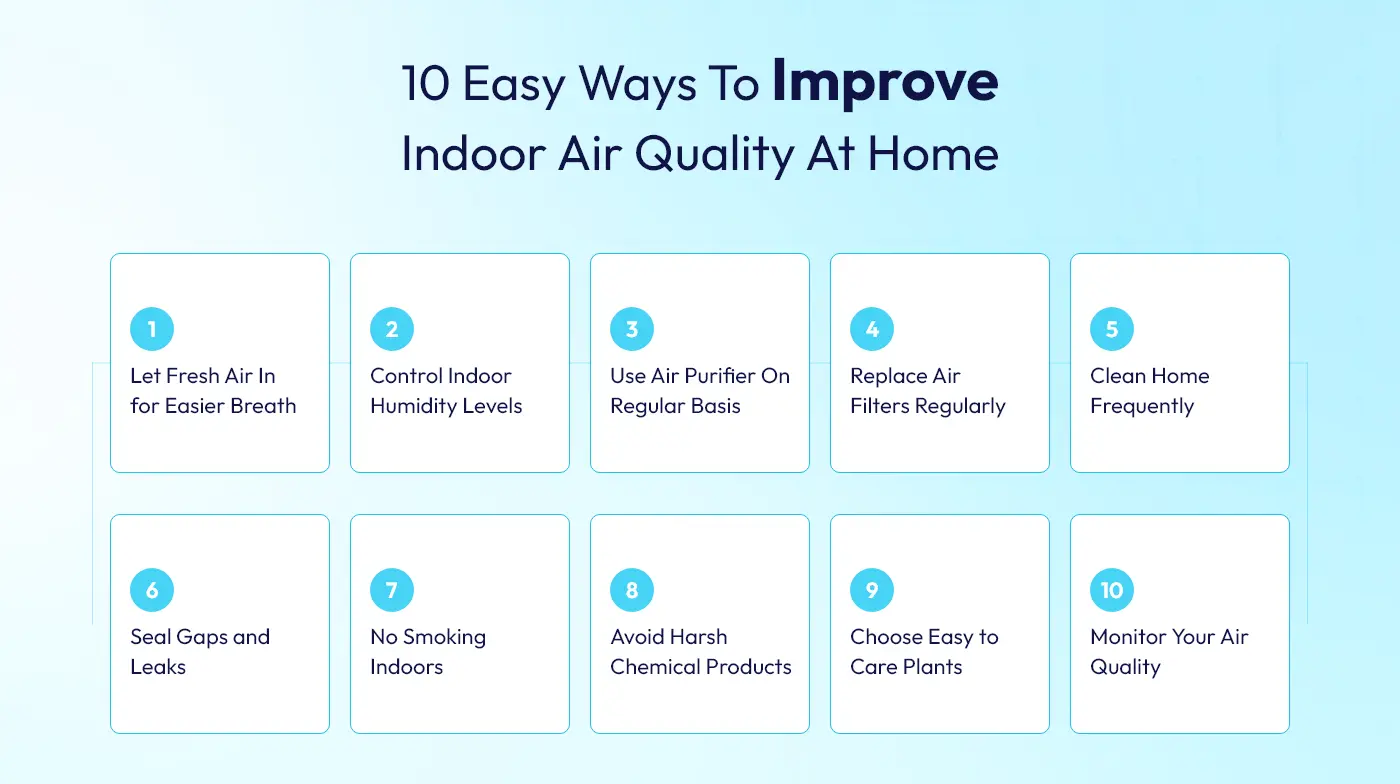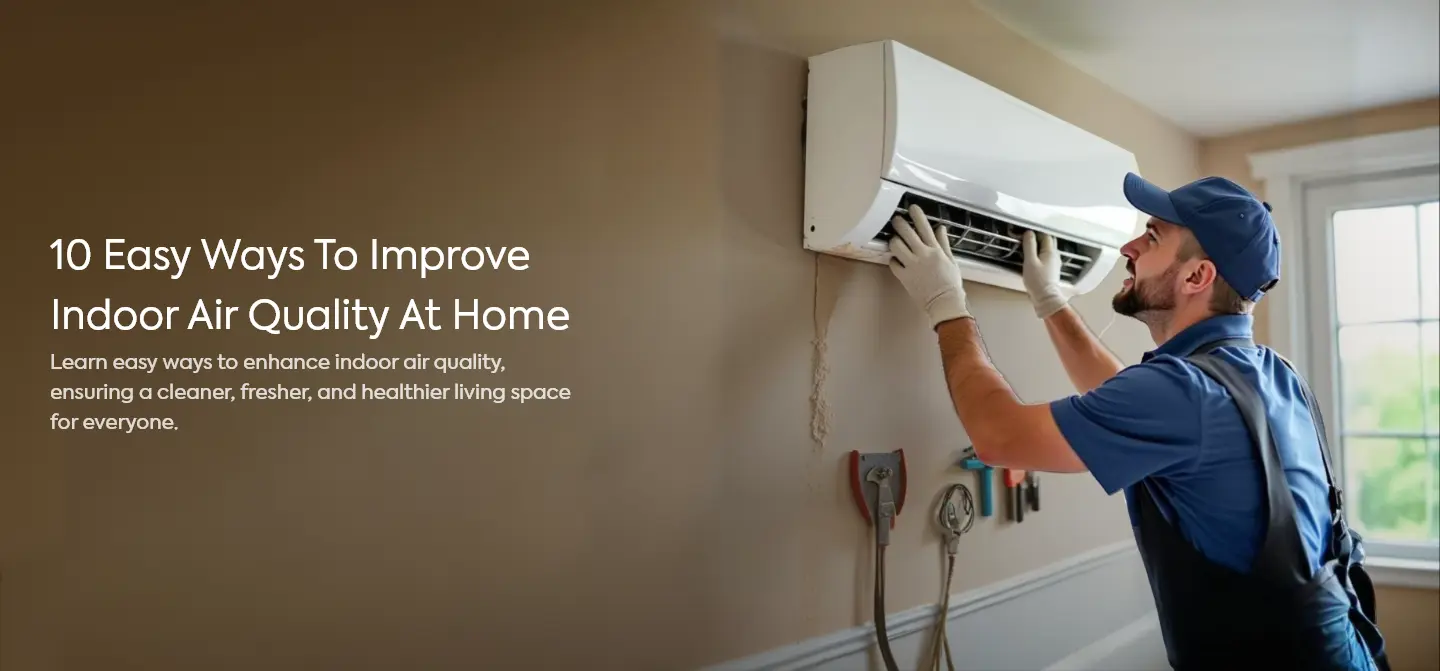The growing indoor air quality concern in the US compelled many families to pay attention to creating healthier homes. Poor air quality would lead to a variety of allergy conditions, asthma, and other breathing problems.
Why is improving indoor air quality important?
With the growing indoor air quality concern in the US, people are seeking ways to make their homes safer. Besides causing allergies, poor air quality can trigger more health issues in the long run. Harmful substances enter the air from dust, chemicals, and even items such as household products. Making small changes such as using air purifiers or sealing windows can reduce the risk.
Fortunately, it’s not as tough to make the air cleaner in your home because some minor changes can be helpful. Here are 10 easy ways to improve the air you breathe indoors:

-
Let Fresh Air In
It is important to understand that fresh air also plays a crucial role that is to assist in the eradicating of indoor polluting substances. You can also let the fresh air in and remove the old air during the pleasant weather using your doors and windows. Apart from that if the weather is not good or you live in an area that has a high emission of pollutants then you can use the exhaust fans in the kitchen and bathroom. Drawing out cooking odours, steam, and other fumes and gases, these fans are essential elements in modern kitchens.
-
Keep Humidity Under Control
High humidity levels also lead to mold formation as well as the breeding of dust mites. However, both are toxic for your body. Keeping your home’s indoor humidity between 30-50% helps maintain a comfortable environment. A dehumidifier can be especially useful in damp areas like the bathroom, kitchen, and basement, effectively reducing moisture. Additionally, exhaust fans play a key role in keeping these spaces dry and preventing excess humidity build-up.
-
Use an Air Purifier
You could improve indoor air quality at home by having an air purifier. Ensure that it has a HEPA filter to trap small particles like dust, pollen, and mold spores. For optimal performance, install purifiers in your bedrooms or living rooms.
-
Use Clean Air Filters
Maintain good indoor air quality at home by ensuring that the filters in your air purifiers are replaced at the recommended time.
In Greenwood, if your house is equipped with heating or cooling, they most probably also employ air filters that trap all dust and other particles within the air. Over time, these filters get clogged, and they won’t work as well. Replace them every 1-3 months based on your usage. Clean filters ensure that there will be less circulating allergens and dust in your home.
-
Clean Your Home Often
Dust, dander from pets, and other particulates can lead to poor indoor air quality. Frequent cleaning can help. Vacuum floors and carpets every week with a HEPA filter vacuum cleaner. Be sure to dust your furniture, shelves, and all surfaces to keep allergens in check. Also, be sure to wash bedding and curtains often to eliminate dust mites.
-
Seal Doors and Windows
Leakages around doors and windows allow air pollutants from the outdoors to enter your home. Fill gaps or cracks with caulking or weather-stripping. This helps reduce indoor air pollution and in return makes your house energy-efficient.
-
No Smoking Indoors
Smoking inside was probably the worst thing for indoor air quality. Cigarette smoke emitted toxics in the air long after the smoke itself is gone. To keep the air clean, proclaim your house as a smoke-free zone.
-
Reduce Products Containing Harsh Chemicals
Any household item, like paints, cleaning sprays, and sprays for freshening the air, contains volatile organic compounds. The chemicals can make indoor air unhealthy. To reduce VOCs, opt for products labeled “low-VOC” or “VOC-free.” Avoid the excessive use of scented sprays or candles which contribute to indoor pollution.
-
Use Plants Wisely
Some plants absorb toxins and make air quality better. However, they can collect dust and even become green algae if not cared for properly. So, if you want plants in your home, try to pick those don’t require a lot of watering- Snake plants and Peace Lilies do a pretty good job. Pay special attention to wiping off their leaves and you should also avoid overwatering them.
-
Watch Your Air Quality
Air quality monitors can also assist you in tracing the common indoor pollutants, which include carbon dioxide, VOCs, and dust. These monitors give real-time updates about the air at your home. If their levels are high, you know it is time to take action.
Final Thoughts
Indoor air is a very important factor concerning your overall health. It’s easy to worry about outdoor pollution, but indoor air can actually be a bigger problem. The EPA (Environmental Protection Agency) has found that indoor air is 2–5 times more polluted than outdoor air.
In the Midwest, where seasonal changes often lead to fluctuating indoor air quality, proper HVAC maintenance is key to ensuring a comfortable and healthy living environment. You can opt for some of the best furnace maintenance services in Greenwood, which can significantly help in keeping your home’s air clean.
You do not need drastic measures to clean the air in your home. Start by doing some of the things like regularly cleaning, opening windows for fresh air circulation, and utilizing an air purifier. Monitor the humidity and avoid using strong chemicals inside your home. These small efforts can achieve a healthier and more comfortable home.
As more people pay attention to this growing indoor air quality concern in the US, these tips can guide you toward breathing easier and towards creating a safe environment for your family. Make these changes today, and enjoy the benefits of cleaner, fresher air for your home.
If you notice constant coughing, sneezing, or itchy eyes, it might be a sign that the air quality is poor. You can also use an air quality monitor to check levels of dust, allergens, and pollutants in your home.
It’s a good idea to clean your home regularly vacuuming at least once a week, dusting surfaces, and washing bedding to reduce dust and allergens that affect air quality.
Yes! Certain plants like snake plants and peace lilies can absorb toxins and help improve the air in your home. Just make sure to care for them properly and avoid overwatering them.
While an air purifier with a HEPA filter can help, you don’t need to spend a lot. Simple steps like opening windows for fresh air, controlling humidity, and using exhaust fans can also make a big difference.
Many air fresheners and scented candles contain chemicals that can pollute the air. It’s best to choose products labeled as “low-VOC” or “VOC-free” and avoid using them excessively to keep the air in your home cleaner.






